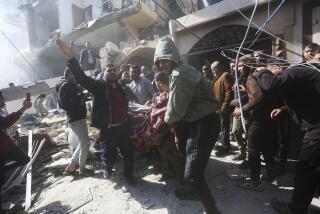The Syria dilemma: Can global atrocities be ranked?
“These images are difficult to watch.”
“Very upsetting.”
“Perhaps the most upsetting.”
So went the warnings issued by CNN correspondent Jake Tapper on Sunday as he narrated the video clips showing the aftermath of the Aug. 21 chemical weapons attack on Syrian civilians. Tapper wasn’t wrong. In the footage, men convulsed and foamed at the mouth and scores of dead and dying children were laid out in haphazard rows.
The “most upsetting” designation went to the slain children, universally accepted as the most atrocious aspect of the atrocity.
“Any parent who sees those videos of those children being gassed I think understands what a human tragedy this is,” President Obama said in a CBS interview.
Senate Majority Leader Harry Reid spoke of “little baby boys and girls dressed in little colorful play clothes … these poisons kill the kids first.”
I, for one, had my hand up when writer Philip Gourevitch, known for his work on genocide and ethnic conflicts, asked in a couple of tweets Sunday night if anyone else was recoiling at the way this rhetoric made it seem “as if gassing adult civilians were comparatively OK.” But given that children have been more or less decreed as international symbols of peace, that discussion would likely collapse under the weight of its own taboo.
In another tweet, however, Gourevitch raised a somewhat broader question. “If intolerance of chemical weapons is best case for striking Syria,” he asked, “how does that not send message that other atrocities are more tolerable?”
In other words, what separates “disturbing” from “difficult” and “very upsetting” from “most upsetting”? Which human rights abuses warrant bombs and which are relegated to fliers distributed by activists in front of Whole Foods or newspaper editorials that kick up just enough dust to settle before people get too worked up?
The president answered that question for himself when he identified chemical weapons as a “red line.” For most Americans, it hasn’t been so cut and dried. The immediate reason is much repeated: We’re war weary. But some of our wariness may be coming from a more visceral, unconscious place. Some of it may be a resistance to the way the White House has in effect asked us to be more upset by this atrocity than by other atrocities.
It has asked us to decide that the gassing of 1,400 Syrians is more punishable than genocide in Sudan and the Democratic Republic of Congo or the human trafficking of an estimated 21 million people a year worldwide. It’s asked us to feel more vengeful about a chemical attack than about rampant sexual violence against women in India or recent news of an 8-year-old in Yemen — forced to marry a 40-year-old man — who died of internal injuries on her wedding night.
In the face of most of these evils, our leaders, including Obama, have generally asked us to cool our heels while some combination of diplomacy, protests and the slow arc of history may bring about change. But somehow this one is different. We’re told it’s because “international law” has been flouted. But aren’t there are also international laws and norms about genocide and child brides?
Of all the missteps made by the Obama administration in recent days, perhaps none shows more naivete than the presumption that the American people, and their representatives, will or even should come to a consensus about where Syria’s chemical warfare falls on the atrocity scale, much less agree that it tips the scale toward military action.
Remarkably, the harder the president tries to sell his plan, the less the public is buying it. One poll found that on Aug. 28 and 29, 50% of Americans supported a limited strike, but after his Rose Garden speech, only 44% did. And the needle didn’t appear to move much after Tuesday’s address.
That may change, but right now, Obama, in trying to appeal to our sense of basic human decency, has succeeded mostly in making us feel confused, conflicted and even resentful about the rather grotesque assignment of comparing atrocities.
That assignment, for many, is as “upsetting” as it is “disturbing.” And for some, it’s nearly impossible.
Twitter: @meghan_daum
More to Read
A cure for the common opinion
Get thought-provoking perspectives with our weekly newsletter.
You may occasionally receive promotional content from the Los Angeles Times.







